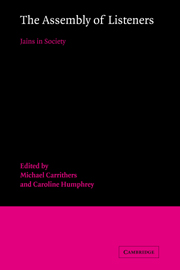Book contents
- Frontmatter
- Contents
- List of illustrations
- List of contributors
- Acknowledgements
- Map: South Asia
- Introduction
- 1 Jains as a community: a position paper
- 1 JAIN IDEALS AND JAIN IDENTITY
- 2 LOCAL JAIN COMMUNITIES
- 6 Local Jain communities
- 7 The Jain merchant castes of Rajasthan: some aspects of the management of social identity in a market town
- 8 Jain shopkeepers and moneylenders: rural informal credit networks in south Rajasthan
- 9 A study of Jains in a Rajasthan town
- 3 JAINS IN THE INDIAN WORLD
- 4 NEW JAIN INSTITUTIONS IN INDIA AND BEYOND
- Conclusion
- Glossary and pronunciation
- Select bibliography
- Index
9 - A study of Jains in a Rajasthan town
Published online by Cambridge University Press: 07 October 2011
- Frontmatter
- Contents
- List of illustrations
- List of contributors
- Acknowledgements
- Map: South Asia
- Introduction
- 1 Jains as a community: a position paper
- 1 JAIN IDEALS AND JAIN IDENTITY
- 2 LOCAL JAIN COMMUNITIES
- 6 Local Jain communities
- 7 The Jain merchant castes of Rajasthan: some aspects of the management of social identity in a market town
- 8 Jain shopkeepers and moneylenders: rural informal credit networks in south Rajasthan
- 9 A study of Jains in a Rajasthan town
- 3 JAINS IN THE INDIAN WORLD
- 4 NEW JAIN INSTITUTIONS IN INDIA AND BEYOND
- Conclusion
- Glossary and pronunciation
- Select bibliography
- Index
Summary
Introduction and overview
Cultural pluralism is a basic characteristic of Indian society. The structural openness of Hinduism explains the pluralism. It is in this context that we need to examine the question of whether or how the Jains are a community.
Let us first examine the features common to all Jains. Jainism is a religion with a distinct and abstract philosophical basis. Its philosophy has given rise to schools of logic, mathematics, geography and literature, architecture and painting. Most of the Jain literature is in the form of manuscripts written in Prakrit or Sanskrit, and very little of it has been translated or published. The ordinary Jain is largely unaware of his philosophical heritage, and emphasises the overt/manifest dimensions of practices in daily life. At a certain level, Jains also share a value system, despite sectarian differences. Dietary practices are commonly shared, for example. Based on the non-killing of animals or insects, these practices are distinct from those of Hindus or people of other religions in India. To eat before sunset, to eat dried vegetables especially on the eighth and fourteenth day of every fortnight, to use boiled water on these days, also during paryūsan (a period of intensified religious observance), and not to use root vegetables such as potatoes, onions, garlic, or those which have a multiplicity of seeds, have been dietary universals of Jains throughout the country. Vegetarianism is the accepted pattern of food consumption among Jains.
- Type
- Chapter
- Information
- The Assembly of ListenersJains in Society, pp. 139 - 162Publisher: Cambridge University PressPrint publication year: 1991
- 2
- Cited by



